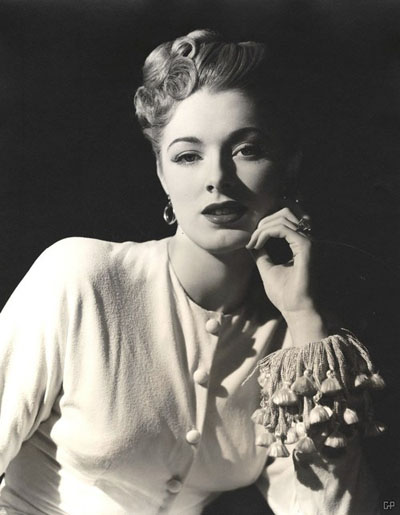“Eleanor Parker, a versatile leading lady of the 1940s, ’50s and ’60s who earned three Oscar nominations—none of which were for her best-known role as the baroness in The Sound of Music—died Monday in Palm Springs of complications of pneumonia,” report Susan King and Elaine Woo for the Los Angeles Times. She was 91. “Parker brought a coolness, reserve and elegance to her portrayal of the baroness who is determined to marry the handsome captain played by Christopher Plummer, only to lose him to his children’s governess, Maria, portrayed by Julie Andrews.”
“The highest accolades of Ms. Parker’s career came a decade before,” notes Anita Gates in the New York Times. “She was nominated for an Oscar for dramatic roles as a wrongly convicted young prisoner in Caged (1950), a police officer’s neglected wife in Detective Story (1951) and an opera star with polio in Interrupted Melody (1955), a biography of the Australian soprano Marjorie Lawrence…. If she never became a star, admirers contended, it was because of her versatility. Sometimes a blonde, sometimes a brunette, often a redhead, Ms. Parker made indelible impressions but submerged herself in a wide range of characters, from a war hero’s noble fiancée in Pride of the Marines (1945) to W. Somerset Maugham’s vicious waitress-prostitute in a remake of Of Human Bondage (1946).”
“One of her most heralded but least seen performances was in Lizzie (1957), a film about a woman with multiple personalities,” adds Adam Bernstein in the Washington Post. “The movie had the misfortune of being released the same year as The Three Faces of Eve, which was heavily promoted to advance the career of newcomer Joanne Woodward. Still, Lizzie remained a powerful and convincing portrayal of three separate identities in one body—a pathologically shy museum worker, a lusty barfly and a well-adjusted woman. Instead of relying on film-editing tricks, Ms. Parker showed subtle but convincing shifts in character in view of the camera. The movie critic Judith Crist once called Lizzie a ‘neglected but fascinating’ film that ‘boasts a stunning performance’ by Ms. Parker.”
At the Alt Film Guide, Andre Soares lays out the biography and adds: “In June 2013, on the occasion of her 91st birthday, Eleanor Parker was Turner Classic Movies’ Star of the Month. I wrote extensively about her and her films at the time. Please check out ‘Eleanor Parker Now on TCM’ and the follow-up articles: ‘Eleanor Parker Movies,’ ‘Eleanor Parker Today,’ ‘Eleanor Parker: Actress Turns 91.’ Also worth checking out: ‘Eleanor Parker, Jean Peters, Jean Arthur, Patricia Neal, and others in “Forgotten Actresses Montage.”‘”
Updates, 12/16: Parker was a “ravishing redhead whose beauty was not her claim to celebrity but an ornament to her craft,” writes Time‘s Richard Corliss. “Indeed, she shone in roles for which her classic good looks—the warm mouth, perfect oval face and eyebrows worthy of a Shakespearean sonnet—might be an irrelevance or a disadvantage. So often, Hollywood said: We’ll take this gorgeous girl and muss her up. Parker jumped at the chance and gave some of the movie midcentury’s strongest performances.” And he revisits several of them with aplomb.
“Dana Andrews, her co-star in Madison Avenue (1962), called her ‘the least heralded great actress,'” notes Ronald Bergan in the Guardian. “One of Parker’s greatest roles was as the polio-afflicted Australian dramatic soprano Marjorie Lawrence in Interrupted Melody (1955). With her voice dubbed by Eileen Farrell in the opera sequences, Parker brought superb emotional power to the part. Again, she was nominated for an Oscar. There followed another string of challenging and contrasting roles: Frank Sinatra’s possessive wife in The Man With the Golden Arm (1955); the unhappy wife in The Seventh Sin (1957), based on Maugham’s The Painted Veil; the handsome widow angling for Sinatra in Frank Capra’s A Hole in the Head (1959) and the long- suffering wife of a wealthy Texas land baron (Robert Mitchum) in Vincente Minnelli’s Home from the Hill (1960).”
“Of all of Eleanor Parker’s diverse performances, the stand out is Caged,” writes Anne Marie at the Film Experience. “Now a cult classic, Caged tells the story of a young lady (Parker) whose experiences in a woman’s prison quickly turn her from naive innocent to cynical con. It could easily be lumped in with other Prison Women movies, but the fact is that for its time Caged was a shocking movie. Topics usually considered verboten by the Hays Code censorship—pregnancy, women’s crime, homosexuality, and corrupt law enforcement—are all taboos attacked by this film. At the center of this whirlwind stands Eleanor Parker, giving one hell of a heartbreaking performance.”
For news and tips throughout the day every day, follow @KeyframeDaily on Twitter and/or the RSS feed. Get Keyframe Daily in your inbox by signing in at fandor.com/daily.




